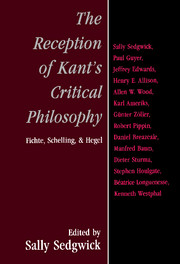Book contents
- Frontmatter
- Contents
- Notes on the Contributors
- Acknowledgments
- Introduction: Idealism from Kant to Hegel
- 1 The Unity of Nature and Freedom: Kant's Conception of the System of Philosophy
- 2 Spinozism, Freedom, and Transcendental Dynamics in Kant's Final System of Transcendental Idealism
- 3 Is the Critique of Judgment “Post-Critical”?
- 4 The “I” as Principle of Practical Philosophy
- 5 The Practical Foundation of Philosophy in Kant, Fichte, and After
- 6 From Critique to Metacritique: Fichte's Transformation of Kant's Transcendental Idealism
- 7 Fichte's Alleged Subjective, Psychological, One-Sided Idealism
- 8 The Spirit of the Wissenschaftslehre
- 9 The Beginnings of Schelling's Philosophy of Nature
- 10 The Nature of Subjectivity: The Critical and Systematic Function of Schelling's Philosophy of Nature
- 11 Substance, Causality, and the Question of Method in Hegel's Science of Logic
- 12 Point of View of Man or Knowledge of God: Kant and Hegel on Concept, Judgment, and Reason
- 13 Kant, Hegel, and the Fate of “the” Intuitive Intellect
- 14 Metaphysics and Morality in Kant and Hegel
- Bibliography
- Index
5 - The Practical Foundation of Philosophy in Kant, Fichte, and After
Published online by Cambridge University Press: 03 December 2009
- Frontmatter
- Contents
- Notes on the Contributors
- Acknowledgments
- Introduction: Idealism from Kant to Hegel
- 1 The Unity of Nature and Freedom: Kant's Conception of the System of Philosophy
- 2 Spinozism, Freedom, and Transcendental Dynamics in Kant's Final System of Transcendental Idealism
- 3 Is the Critique of Judgment “Post-Critical”?
- 4 The “I” as Principle of Practical Philosophy
- 5 The Practical Foundation of Philosophy in Kant, Fichte, and After
- 6 From Critique to Metacritique: Fichte's Transformation of Kant's Transcendental Idealism
- 7 Fichte's Alleged Subjective, Psychological, One-Sided Idealism
- 8 The Spirit of the Wissenschaftslehre
- 9 The Beginnings of Schelling's Philosophy of Nature
- 10 The Nature of Subjectivity: The Critical and Systematic Function of Schelling's Philosophy of Nature
- 11 Substance, Causality, and the Question of Method in Hegel's Science of Logic
- 12 Point of View of Man or Knowledge of God: Kant and Hegel on Concept, Judgment, and Reason
- 13 Kant, Hegel, and the Fate of “the” Intuitive Intellect
- 14 Metaphysics and Morality in Kant and Hegel
- Bibliography
- Index
Summary
Fichte's work, and especially his emphasis on the self's activity, has been receiving considerable attention recently, and even in America important philosophers have made claims that it points to significant improvements on Kant's philosophy. Elsewhere I have challenged some of these claims, in particular as they bear on a precise understanding of the central notion of the activity of apperception, and on the detailed interpretation of some key passages in Fichte regarding the “primacy of the practical.” On this occasion, I will present a somewhat broader view of the transition from Kant to Fichte, while expanding on my reading of this period as marked by a premature move toward a radical kind of “practical” foundationalism.
After stepping back briefly to sketch a very general picture of the peculiar context and impact of the early reception of Kant (sec. I.1), I will review the Critical texts most relevant for explaining the basic features of Fichte's reaction and the popularity of positions like Fichte's in our own time (sec. I.2). From this interpretive perspective I will then draw some critical implications for evaluating an important account of this period developed recently by Allen Wood (sec. II). Whereas Wood presents Fichte as improving in places on Kant's program, I will offer reasons for regarding Fichte's reaction as an understandable but questionable departure from the Critical philosophy.
The immediate reaction to the Critique of Pure Reason (1781, second edition 1787) was highly unusual.
- Type
- Chapter
- Information
- The Reception of Kant's Critical PhilosophyFichte, Schelling, and Hegel, pp. 109 - 128Publisher: Cambridge University PressPrint publication year: 2000
- 3
- Cited by



